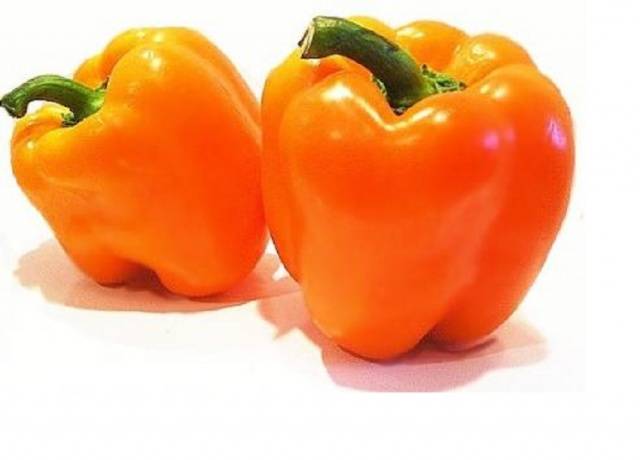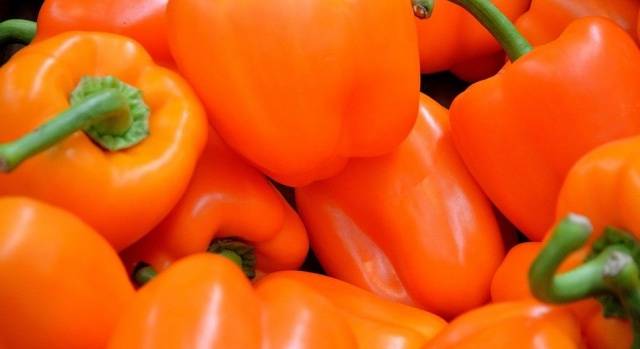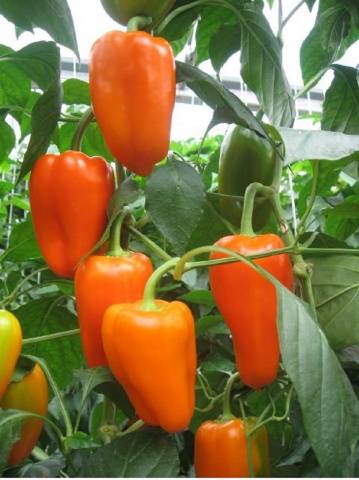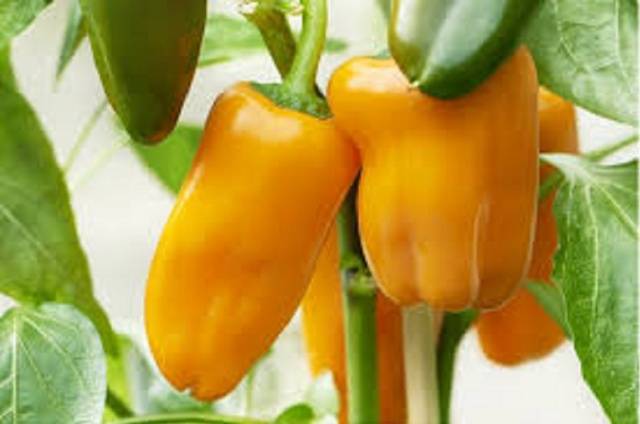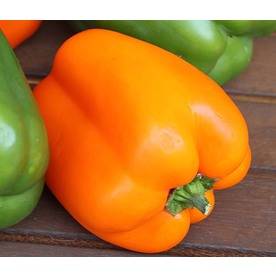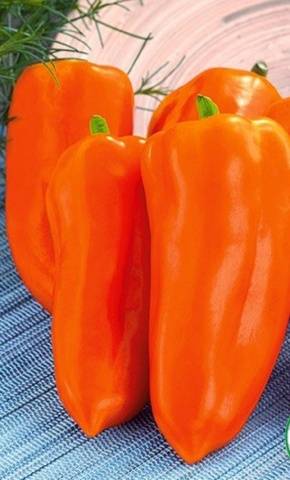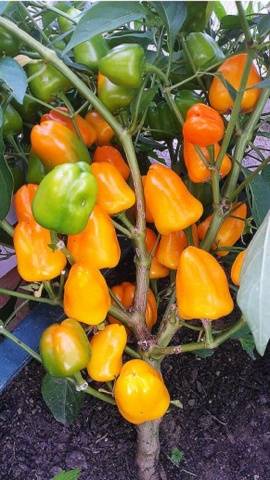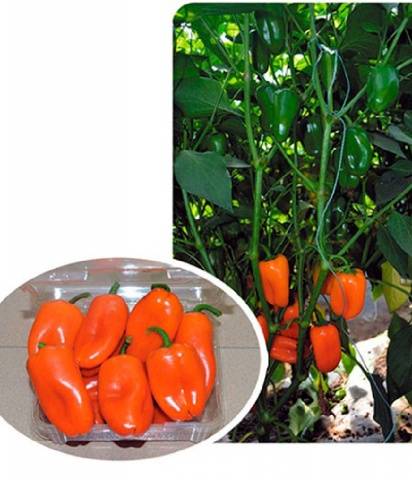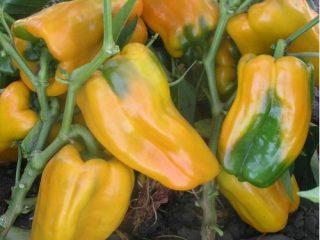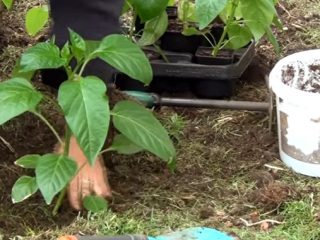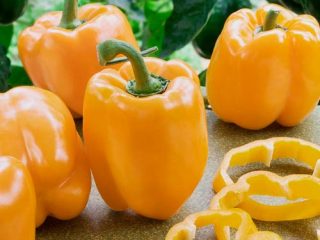Content
Bell peppers need no introduction. Rarely can anyone not know about this wonderful source of vitamins, nutrients and good mood. It is the beautiful and bright orange fruits that create a rainbow mood on the garden bed or dining table.
In modern vegetable growing, you can find peppers of different colors - green, yellow, orange, red, purple, white. One should not think that its color directly depends on the degree of maturity. Green peppers do not necessarily turn red or orange during storage. But peppers of any kind and color have a green color when unripe. The color directly depends on the variety.
Why should you pay attention to the color of the fruit of the pepper? Each pepper contains a ton of nutrients and minerals our body needs, as well as capsaicin. It is an alkaloid that gives a peculiar taste to peppers and has a beneficial effect on the digestive tract. But, red is still distinguished by a high content of ascorbic acid and vitamin A, yellow or orange is in the lead in terms of rutin, potassium, phosphorus, which serves as an excellent opportunity to strengthen and maintain the elasticity of blood vessels. Green (and unripe too) is considered, according to scientists, a good remedy for tumor manifestations. Orange bell pepper remains very attractive for many gardeners. How to correctly and accurately determine the desired variety?
The choice of a variety is a responsible business
Sweet pepper is an annual plant. After harvesting, you need to immediately think about the next season and try to find the most optimal type of orange pepper. When choosing a variety, you should take into account some important indicators on which the result depends. First of all, you have to remember that this culture is divided according to:
- Ripening terms... The main categories are super early, early, mid early, mid late, and late. The ripening period for orange peppers is quite long, so many gardeners are trying to grow an early or super-early variety on their plots. This is due to the fact that in many regions the duration of the warm season is limited, and the favorite vegetable does not have time to reach its full ripeness. Therefore, all varieties of peppers are grown in seedlings, preparing planting material for themselves in advance. But late varieties of orange peppers can be safely transplanted into pots at the end of the season and continue growing at home. In this case, you will be able to enjoy fresh peppers until mid-winter. Experienced gardeners simultaneously plant varieties with different ripening periods. When early orange peppers stop bearing fruit, it's time for later varieties. Throughout the season, you don't have to think about where to get fresh healthy vegetables.
- Growing conditions... Here you can choose between two options - open ground or a greenhouse. Not every variety that bears fruit well under a film cover will yield the same rich harvest outdoors. The main thing is to provide orange peppers with the right temperature, enough light and proper watering. Therefore, taking into account the experience and conditions of the site, it is better to stop your attention on a certain variety that will fulfill all the requirements. It is advisable to read the information on the seed packaging. The best varieties are always the most sought after.
- The appearance and size of the bush... The first indicator refers to aesthetic requirements, and the second will have to be taken into account in order to correctly calculate the planting scheme on the site. This is very important for small areas or with low film shelters. Here you will have to give preference to undersized varieties of orange peppers.
- Disease resistance... Modern breeders have developed certain varieties and hybrids of orange peppers that exhibit a high degree of disease resistance. This saves a lot of time and money. After all, you do not have to carry out unnecessary chemical treatments.
Using these criteria, you can easily select the orange pepper variety that is suitable for a region with specific light conditions, climate, soil composition.
How to grow a good harvest
Orange peppers are a demanding culture for air temperature, therefore they are considered big sissies. If it gets much colder at night, then additional heating (for seedlings) or a film shelter in the open ground is required. Another requirement relates to soil and air moisture. Neither one nor the other can be overdried. For seedlings of orange peppers, before planting for permanent residence, it is best to harden. In regions with a cool climate, before June, young plants are generally not recommended to be planted in open ground.
To bypass the need for planting plants - use disposable cups (large) or pots. This will protect the root system from unnecessary trauma. The soil is also prepared before sowing the seeds. In an adult plant, some of the stepsons are removed, which allows the remaining peppers to reach full maturity. For varieties of large-fruited peppers, you should strictly follow the feeding scheme in order to get the desired result. What fertilizers pepper loves, it is better to find out in specialized literature. And necessarily - light, watering and care.
Orange peppers, which ripen early, are very popular among fans of this culture. The bright color of the fruits, thick juicy walls, a large harvest - make the cultivation of such beauties a very pleasant experience.
Which orange varieties ripen early
To get bright orange fruits early enough, you should pay attention to early ripening sweet peppers. After all, if the orange pepper does not reach its biological ripeness, its color will be completely different. Among the many wonderful species, gardeners prefer to grow certain of the best varieties. The most popular early varieties:
"Orange Wonder F1"
The most popular Dutch orange sweet pepper. Differs in a very beautiful saturated color of the fruit - bright orange. Refers to early maturing hybrids, capable of producing crops in 95 days. The bush is medium, can reach a height of up to 100 cm. The peppers on the bushes ripen large (up to 250 g), cuboid and very tasty. The pulp attracts with its tenderness and softness, although the wall thickness is decent - 7mm. Subject to agricultural technology, it gives a yield of up to 15 kg per 1 sq. m. It grows well both in the greenhouse and in the open field, which makes the variety very popular. Derived with a high degree of disease resistance. You can sow seeds at the end of February. When the temperature drops, cover the seedlings. It is demanding on nutrition and watering, because it belongs to the varieties of large peppers. Has an excellent and attractive presentation, well transported.
"Orange Delight F1"
The hybrid is early ripening with a low compact bush and small fruits. Suitable for indoor cultivation - greenhouses, flowerpots and patios. A beautiful variety with thick-walled (up to 8 mm) peppers. During the ripening period, it changes color from light green to dark orange. The peppercorns taste great both fresh and after canning. They grow to a mass of 150-180 g in 100 days. At the same time, 16-18 fruits can be set on the bush. Features of the variety:
- high yield - at least 10 kg / m2 in the greenhouse, in the extended mode 16 kg / m2;
- pleasant taste that does not depend on processing and delicate skin;
- excellent presentation;
- high content of vitamins, fiber, antioxidants.
Sowing seeds is carried out in early March. Seedlings are ready for transplantation in 70 days. They are planted according to the 50x35 scheme or in separate flowerpots.
"Orange Beauty F1"
An early ripe solar hybrid of pepper. A standard bush that does not require formation, reaching a height of 1 m. Ripe peppers are ready for harvesting already 90 days after the appearance of the first sprouts. The fruits are large, over 210 g, cuboid (or cuboid-prismatic), with a thick wall. Peppers are very juicy and sweet in taste. The main benefit is the high content of ß-carotene. Benefits:
- endurance to verticillary wilt;
- high yield - up to 9.5 kg / m2;
- suitable for any soil.
So that the plants do not shade each other, it is necessary to withstand the planting density. For 1 sq. m should be no more than 7 bushes.
Orange Wonder F1
Another excellent early fruiting orange bell pepper. The height of the bush is 1 m, the technical ripeness occurs in 105 days. At this time, the fruits are green, and then acquire a bright orange sunny color. The mass of one pepper reaches 250 g, therefore "Orange Wonder F1" belongs to large-fruited varieties with a thick wall (up to 1 cm). The seeds germinate relatively quickly, which also distinguishes it favorably from other hybrids. While maintaining the optimum temperature, full germination is observed after 2 weeks. It bears fruit well in greenhouses at a planting density of 3 plants per 1 sq. m of soil. Under favorable conditions, it yields up to 15 kg per square meter.
"Orange Bull F1"
This wonderful bell pepper belongs to the mid-early ripening period. A hybrid variety that has a lot of advantages, gardeners really like it. Among the obvious advantages of the Orange Bull, it is worth noting:
- High yield... This allows you to get enough orange fruit in a small area.
- Large-fruited... Quite massive peppers (over 200 g, sometimes up to 400 g) have an elongated shape, which also attracts lovers of orange vegetables. The wall of the fetus reaches 8 mm in thickness.
- Disease resistance... The hybrid's ability to resist tobacco mosaic and potato viruses well allows it to grow a good crop without too many problems.
- Suitable for any soil... If it is not possible to equip a greenhouse, then growing a hybrid in the open air will turn out to be no worse. Under a film cover, you can increase the fruiting period.
It is better to germinate the seeds before sowing. They are sown in seedling containers with a planting depth of 0.5 cm. After an acceptable temperature regime has been established, orange peppers are planted for permanent residence.
Large peppers are used in any form. Only when canning, sometimes it is necessary to cut large peppers, which do not fit in a glass container.
"Kinkan F1"
Orange mini pepper. The fruits grow small, only up to 30 g in weight and 5 cm in size, but this does not make the variety less attractive. On the contrary, the ability to grow this orange pepper in any conditions makes it versatile for lovers of sunny colors. Such beauty can be planted in an original pot, on a windowsill in a beautiful flowerpot, in a greenhouse, among plants in the open air. Everywhere he will give a unique charm, decorate any area. The bushes are small, only up to half a meter high, but completely covered with peppers. They look great in jars, salads and on the dinner table. The cultivation technique is classic for orange peppers, only the seeds are recommended to germinate before sowing.
"Orange mini F1"
Another attractive hybrid of mini peppers. Small (35 g), fleshy and dense, very beautiful and healthy. The content of vitamin C and sugars is very high. The bushes are small, but completely covered with bright peppers, which create an unusual design against the background of green foliage. It grows in any soil and on the windowsill too. Orange pepper seeds are germinated, then sown in seedling containers. After 2 weeks, seedlings will appear and, with good care, the seedlings will be strong and healthy. Special conditions for a good harvest are not required, the main factors are watering, light, heat and nutrition. If it is possible to provide fertile and nutritious soil, then a mini pepper will fully satisfy your need for fresh fruits. Great for summer meals and canning.
Conclusion
In addition to the types of orange pepper considered, you should pay attention to such names as “Golden Lantern ”,“ Giant Orange ”,“ Orange Lion F1 ”,“ Orange King ”,“ Orange Prince ”,“ Orange Mango ”,“ Orange Jubilee ”,“ Orange ”,“ Apricot Favorite ”,“ Perun ”... Each of the listed peppers has its own zest, and even the most demanding gardeners will definitely have it. The best varieties of orange peppers will always be loved and celebrated.
Video for beginner gardeners:
